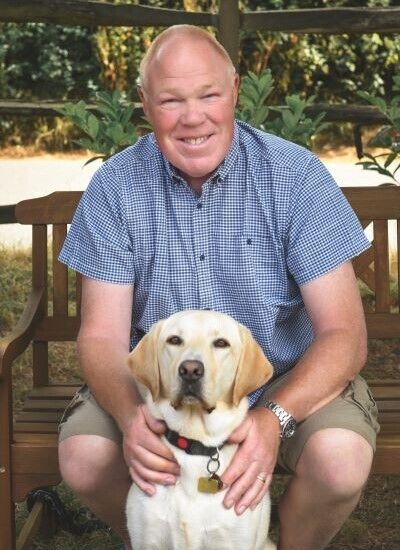Kevin’s story: Retinitis pigmentosa and possible Usher syndrome
Kevin is a retired managing director of a manufacturing company. He is married with 2 daughters, 3 grandchildren (and another on the way), and a guide dog called Kaleb.

About retinitis pigmentosa
Retinitis pigmentosa (RP) is the most common inherited eye condition. It causes the light-sensing cells of the retina to gradually deteriorate, causing a gradual decline in vision. Variations in any one of more than 80 genes can cause the condition. It’s not unusual for cases to occur where there is no family history of the condition.
1 in every 4,000
people in the UK are affected
>80 genes
have been identified to cause RP
About Usher syndrome
Usher syndrome is a rare inherited condition that affects both vision and hearing. The symptoms consist of hearing loss (which usually starts in childhood), progressive vision loss (retinitis pigmentosa), and occasionally balance problems.
Around 10,000
people in the UK are affected
3 types have been identified
Usher type 1, Usher type 2 and Usher type 3
Kevin’s story

Kevin initially started to notice problems with night vision when he was in his late twenties, and his eyesight very slowly started to deteriorate.
In 2009, he began to develop hearing loss. But as he was a musician, he figured it was due to performing in noisy environments.
After several appointments, his doctors thought he may have Usher syndrome, which would explain both the problems with his hearing and sight.
Getting a diagnosis
Kevin was about 35 years old when he was given the diagnosis of retinitis pigmentosa by a consultant at Moorfields Eye Hospital.
When doctors decided that Usher syndrome was a possibility, they offered Kevin the opportunity to take part in the 100,000 Genomes Project to try and determine the cause. He joined the Project and donated his genome in 2016, together with both his parents.
To date, analysis has been inconclusive, and Kevin is uncertain whether Usher syndrome is the cause of his sight and hearing loss.
Kevin explains: “One marker was found for Usher type 2A, but normally 2 markers (2 genes) would be found – one from each parent – which will cause the condition. Because I only have one marker, currently we’re not sure if a diagnosis of Usher syndrome is correct or not.”
Living with sight and hearing loss
After getting his retinitis pigmentosa diagnosis, Kevin continued with his day-to-day life until he was about 54 years old. At that time, his vision suddenly underwent a very rapid deterioration.
This resulted in everyday changes such as needing to use a guide dog. Kevin has been registered severely sight impaired – blind (SSI) since January 2019.
Currently he describes his sight as being only 2 to 3 degrees of central vision, and he wears hearing aids for moderate hearing loss.
The importance of diagnosis
Even though no one in his family has any symptoms, Kevin encourages his daughters to have regular sight tests. Whenever they see an optician, they ask to have their retinas closely checked as a precaution.
If a gene match is discovered for his condition Kevin says all his children and grandchildren will be tested.
He explains: “It is an ongoing process and although we’re in a grey area now, maybe in a few weeks, a few years, we will know something.”
How whole genome sequencing can help those with retinitis pigmentosa
Even though Kevin is still waiting for a definitive genetic diagnosis, he remains enthusiastic about the benefits of having whole genome sequencing for rare conditions, raising awareness, and taking part in research.
He explains: “Being in the system is of great importance and anything I can do to contribute to advancing knowledge about the cause of these conditions is so important.
We need more people to come forward and get tested, contribute to research and lead to potential treatments. I will do anything to help and am very interested in all the research taking place. I’m hoping one day they will establish the genetic cause for a range of sight loss conditions and develop a variety of treatments.”